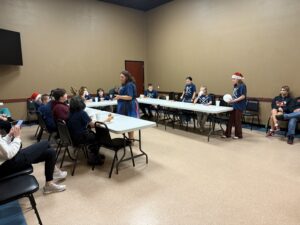
By: Sunnie Dawn Baker
 Chahtapreneur is a combination of two words: Chahta, which is Choctaw for Choctaw, and Entrepreneur. This re-branding provides entrepreneurs with a unique identity, forged in the Choctaw culture. Culture is important to Billy Hamilton and his team. He is the first director of the Choctaw Small Business Development Program and oversees the Chahtapreneur Center for the Choctaw Nation. He says, “Our vision is faith, family, and culture. Everything we do is wrapped up in these values and we try to pass it on to tribal members as well.”
Chahtapreneur is a combination of two words: Chahta, which is Choctaw for Choctaw, and Entrepreneur. This re-branding provides entrepreneurs with a unique identity, forged in the Choctaw culture. Culture is important to Billy Hamilton and his team. He is the first director of the Choctaw Small Business Development Program and oversees the Chahtapreneur Center for the Choctaw Nation. He says, “Our vision is faith, family, and culture. Everything we do is wrapped up in these values and we try to pass it on to tribal members as well.”
Billy Hamilton has a passion for entrepreneurship and a deep desire to help people succeed. He is a Cherokee Nation citizen and previously ran the Native American Business Center for Rural Enterprises of Oklahoma. Over the course of five years working there, he traveled throughout Oklahoma and worked with many of tribes carrying out entrepreneurship programs. While some tribes had dedicated support for entrepreneurs, the Choctaw Nation did not have a fully developed program to offer quality entrepreneurial services to all its Tribal members. However, when Chief Gary Batton was elected in 2014, he was determined to change this fact. And that is when Hamilton saw an opportunity.
Hamilton has been in this position for the past nine years, literally growing the Choctaw Small Business Development program from the ground up. In the beginning, he saw the changes that Chief Batton was making and knew that some of the changes could be beneficial to entrepreneurs. Hamilton made a pitch for a Choctaw Nation specific vision of a small business development program. The Choctaw Nation appreciated his vision and hired him to further develop it and put his plans into action.
In the beginning, Hamilton had zero clients and one other employee. Now, though, nine years later, the Choctaw Nation Small Business Development Program has sixteen dedicated employees and 2,300 clients in the ten and a half counties that encompass the Choctaw Nation. Of those clients, 1,411 are currently operating their business within the Choctaw Nation Reservation. Those businesses have a tremendous impact on their territory, providing around 4,000 jobs. They have another 900 clients who have not yet started their businesses but are wanting to in the future. However, these clients aren’t just entrepreneurs—they are Chahtapreneurs.
Another part of this culture is one-on-one interaction, which Hamilton’s team achieves in several ways. Hamilton adds that the “real backbone of this organization is the small business advisors.” Before they expanded their capacity, there would be three to four hundred clients per advisor. However, now that they have been able to hire more business advisors, the ratio has dropped down to around a hundred clients per advisor, which is much more sustainable. These business advisors provide one-on-one counseling to their Chahtapreneurs that are either in business or wanting to start a business. Because each individual is at a different stage in their business development, the advisors have to be flexible and really meet each person where they are in the process.
While the one-on-one counseling gives the individualized help that the Chahtapreneur needs, Hamilton recognizes that it is also important for these people to come together and connect with one another. In this way they can learn from each other—sharing their own challenges and success stories. They aren’t competing against each other, they are helping and collaborating. This is one reason that Choctaw Small Business Development has pushed to open up co-working spaces for the Chahtapreneurs to rent space at a very reasonable cost. Not only does it get people out of their house into an office environment where they can work with minimal distractions, but it also gives them the opportunity to network, mingle, and learn.
They currently have a co-working space open in Idabel and the co-working space in Durant is planning on having their grand opening in July of this year. In the future, Hamilton is wanting to open co-working centers in McAlester, Poteau, and a micro-centers in smaller communities throughout the reservation. In addition to providing Chahtapreneurs with work space, his team is also planning on hosting events like weekly trainings, networking breakfasts, and lunch-and-learns to help further support his clients in their goals and dreams.
Hamilton and his staff at the Choctaw Small Business Development Program don’t just help the businesses begin; they support them throughout the whole process and try to find ways to help them be better and also gain more customers. They put out a Christmas catalog that features products from their Chahtapreneurs and last year the stock available sold out. This not only brings money into the hands of Chahtapreneurs, but also helps build their own brand. Another service is their mystery shopper program, where Choctaw Small Business Staff will send a mystery shopper into the business to evaluate how the business is performing and operating. This helps give these Chahtapreneurs feedback from an outside perspective, which they might not otherwise receive from their friends, family, or loyal customers.
One of the most innovative ways that the Choctaw Small Business Development Program is helping, though, is through their “Chahtapreneur” app. Currently there are about 400 Choctaw businesses on the app, and Hamilton is hoping to increase the number to seven or eight hundred by the end of the year. Eventually, he would like the app to open up nation-wide so people could find Choctaw owned businesses from New York to California, but that is a goal for the future. In the app, you can choose from many different options to find any kind of business you would like that is run by a Chahtapreneur. There is also a feature to search by “nearby” businesses with a Choctaw owner or founder.
Hamilton and his team strive to help people achieve their goals and dreams, but also do so in a responsible manner. The one-on-one advisors encourage their Chahtapreneurs, but also make sure that they are looking at their business in a financially sound way. By connecting these Chahtapreneurs with co-working spaces and events, he is helping to build a community that is supportive and encouraging. Hamilton has a passion to help entrepreneurs however he can and through the support of the Choctaw Nation, he is building a new entrepreneurial culture that melds community with the modern business support programs.
Sign up to receive more news from the Ada Jobs Foundation HERE!
Written by
Jessika Leatherbury
You may also interested in:

Adapt and Overcome: Allison Poe’s Recipe for Resilience and Growth
By: Sunnie Dawn Baker Allison Poe has always followed her feet. She waits for the signs to appear and, once she recognizes them, she travels that path, and has never
Jeff Warren: A Life in Sound, Vision, and Storytelling
By: Sunnie Dawn Baker When Jeff Warren got involved in the Houston music scene as a teenager, he had no clue where his path would lead. Now, nearly thirty years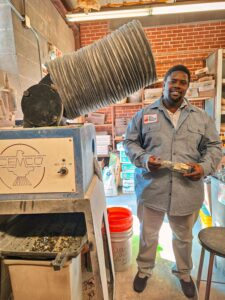
From Pitch to Progress: ECU's Glass Recycling Program Turns Waste into Opportunity
By: Sunnie Dawn Baker In 2018, Dr. Christine Pappas competed in Ada Jobs Foundation’s Big Pitch Competition by promoting grinding glass bottles into sand. She won the Big Pitch that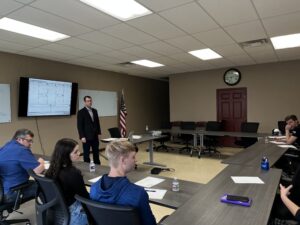
The Importance of Customer Discovery: Know Your Audience and Know Your Market
By: Sunnie Dawn Baker Entrepreneurs and small business owners must consider many factors to achieve success, with their target market being one of the most crucial. Sometimes, when people are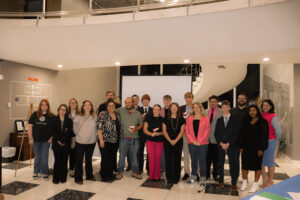
What Does Economic Development Do for You? The Significance of the Economic Multiplier
By: Sunnie Dawn Baker People often find the term “economic development” vague and confusing. Understanding how economic development works and benefits the community can be challenging. Though there are many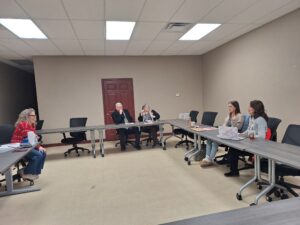
Helping Entrepreneurs One Workshop at a Time: Lauri Rowe and QuickBooks for Small Businesses
Entrepreneurs tend to be filled with passion and big ideas. They have found a solution to a problem they see in the world, and they barrel ahead, excited for their
Hunter Cook: Technology, Entrepreneurship, and the Written Word
By: Sunnie Dawn Baker Hunter Cook started writing when he was seven years old. At first, he wanted to write comic books, but then he realized he couldn’t draw. He
Empowering Native Artists: FAME App Brings Innovation to First American E-Commerce
By: Sunnie Dawn Baker Entrepreneurs are problem solvers. They are constantly striving for solutions to issues they see in the world or in their own lives. In the case of
Learn, Connect, and Grow: 2025 Workshops for Aspiring and Current Business Owners
By: Sunnie Dawn Baker A new year brings new possibilities, and, at the Ada Jobs Foundation, it also brings a new round of programming and workshops. As the local Economic